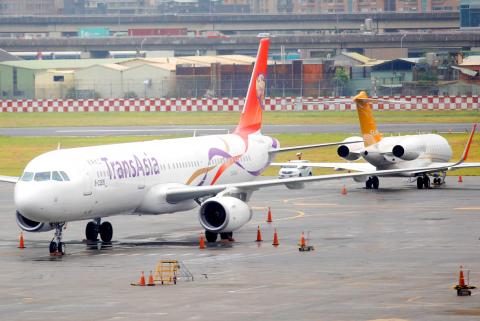TransAsia Airways Corp (復興航空) is negotiating with Airbus Group SE over the possibility of recovering NT$1.2 billion (US$37.57 million) it has made in down payments for 10 new aircraft, the carrier said yesterday.
TransAsia made the statement in response to speculation by some aviation industry insiders that as the company has announced its dissolution, it will lose the down payments for the new aircraft, which they estimated at NT$5 billion.
TransAsia placed orders for six A321neo aircraft in 2010 and four A330-800neo aircraft in 2014. They were scheduled to be delivered starting in 2018. The two models are officially priced at more than US$70 million and US$250 million respectively.

Photo: Reuters
According to the insiders, in an aircraft purchase deal, the manufacturer usually gives a discount to the buyer, but requires a large down payment equal to about one-third of the purchase price, which is usually kept secret.
In TransAsia’s case, the A330-800neos could have been bought at a discounted price of about US$100 million each, while the A321neos might have been sold at a discount of more than 50 percent, they said.
Based on this estimate, the down payments for the 10 aircraft would amount to NT$5 billion, they said.
However, TransAsia said that it had made a down payment of only NT$1.2 billion and that it was negotiating with Airbus in the hopes of getting the money back.
TransAsia on Tuesday announced that it would dissolve due to heavy losses, with all flight services terminated, effective immediately.
The airline posted a net loss of NT$2.22 billion and a loss per share of NT$3.42 in the first nine months of this year, with a gross margin of minus-18.76 percent.
TransAsia has a fleet of 27 aircraft, including 16 leased airplanes and 11 that it owns.
While the leased aircraft are to go back to their leasing companies, the purchased airplanes are to be sold to repay debts.
TransAsia shares fell for the third consecutive session on Friday to close at NT$3.80 on the Taiwan Stock Exchange (TWSE).
Analysts said there is no sign of the plunge ending soon, with orders to sell 81.75 million TransAsia shares still on the books after the market closed on Friday.
The airline is scheduled to hold a special general meeting on Jan. 11 for shareholders to vote on the closure decision, which would set the stage for a delisting from the market, the TWSE said.
Should that happen, a delisting is likely at the end of March after the airline completes all the necessary administrative steps.

Vincent Wei led fellow Singaporean farmers around an empty Malaysian plot, laying out plans for a greenhouse and rows of leafy vegetables. What he pitched was not just space for crops, but a lifeline for growers struggling to make ends meet in a city-state with high prices and little vacant land. The future agriculture hub is part of a joint special economic zone launched last year by the two neighbors, expected to cost US$123 million and produce 10,000 tonnes of fresh produce annually. It is attracting Singaporean farmers with promises of cheaper land, labor and energy just over the border.

US actor Matthew McConaughey has filed recordings of his image and voice with US patent authorities to protect them from unauthorized usage by artificial intelligence (AI) platforms, a representative said earlier this week. Several video clips and audio recordings were registered by the commercial arm of the Just Keep Livin’ Foundation, a non-profit created by the Oscar-winning actor and his wife, Camila, according to the US Patent and Trademark Office database. Many artists are increasingly concerned about the uncontrolled use of their image via generative AI since the rollout of ChatGPT and other AI-powered tools. Several US states have adopted

KEEPING UP: The acquisition of a cleanroom in Taiwan would enable Micron to increase production in a market where demand continues to outpace supply, a Micron official said Micron Technology Inc has signed a letter of intent to buy a fabrication site in Taiwan from Powerchip Semiconductor Manufacturing Corp (力積電) for US$1.8 billion to expand its production of memory chips. Micron would take control of the P5 site in Miaoli County’s Tongluo Township (銅鑼) and plans to ramp up DRAM production in phases after the transaction closes in the second quarter, the company said in a statement on Saturday. The acquisition includes an existing 12 inch fab cleanroom of 27,871m2 and would further position Micron to address growing global demand for memory solutions, the company said. Micron expects the transaction to

A proposed billionaires’ tax in California has ignited a political uproar in Silicon Valley, with tech titans threatening to leave the state while California Governor Gavin Newsom of the Democratic Party maneuvers to defeat a levy that he fears would lead to an exodus of wealth. A technology mecca, California has more billionaires than any other US state — a few hundred, by some estimates. About half its personal income tax revenue, a financial backbone in the nearly US$350 billion budget, comes from the top 1 percent of earners. A large healthcare union is attempting to place a proposal before